
Corchorus capsularis
(MRP Inclusive of all taxes)
- Shipping ₹79 for entire order
- Dispatch in 7 days
- Country of origin: India

(MRP Inclusive of all taxes)
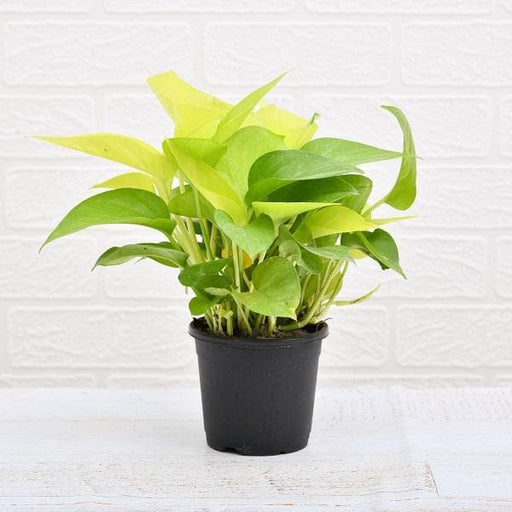 Save 29%
Save 29%
Air Purifier Money Plant with Pot The Air Purifier Money Plant, also known as Pothos or Epipremnum aureum, is a stunning indoor plant that...
View full details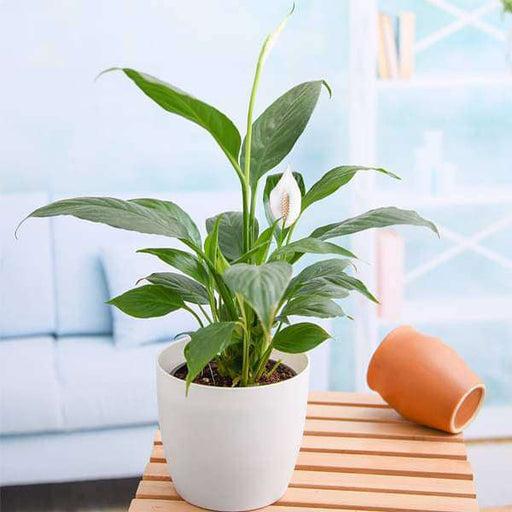
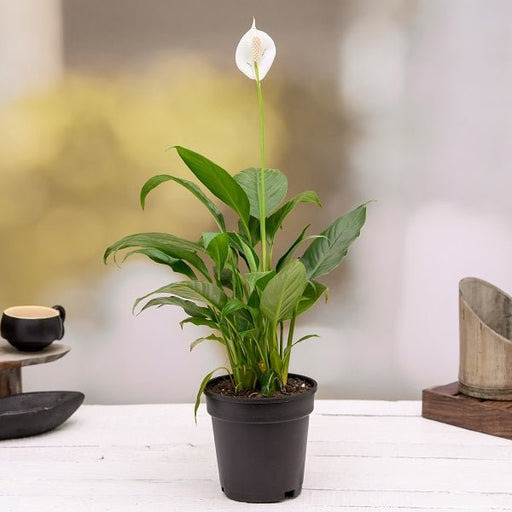 Save up to 15%
Save up to 15%
Peace Lily, Spathiphyllum - Plant The Peace Lily, scientifically known as Spathiphyllum, is a stunning houseplant celebrated for its elegant white...
View full details
 Save 25%
Save 25%
Jasminum sambac, Mogra, Arabian Jasmine - Plant Jasminum sambac, commonly known as Mogra or Arabian Jasmine, is a fragrant flowering plant...
View full details
 Save 18%
Save 18%
Combo Constituents Includes the Parijat Tree (Night-Flowering Jasmine), a culturally significant plant with fragrant flowers. Description The Pari...
View full details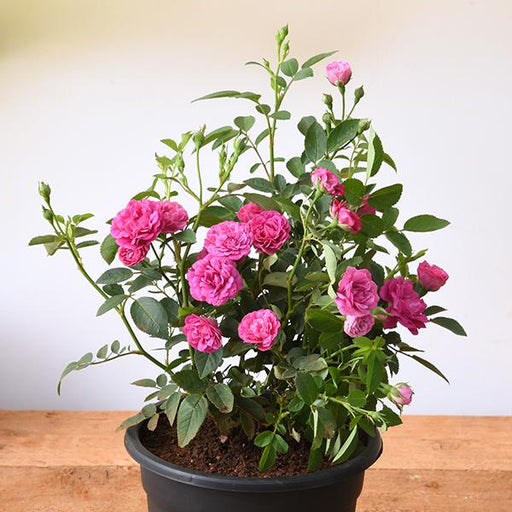
 Save 25%
Save 25%
Miniature Rose, Button Rose (Any Color) - Plant The Miniature Rose, also known as the Button Rose, is a charming and compact flowering plant that ...
View full details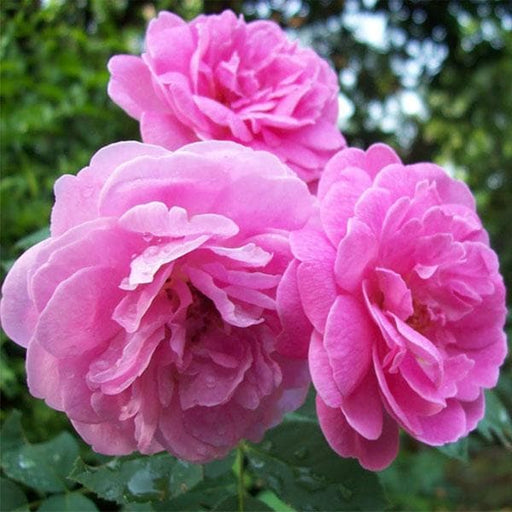 Save 25%
Save 25%
Damascus Rose, Scented Rose (Any Color) - Plant The Damascus Rose, also known as Rosa damascena, is a timeless symbol of beauty and romanc...
View full details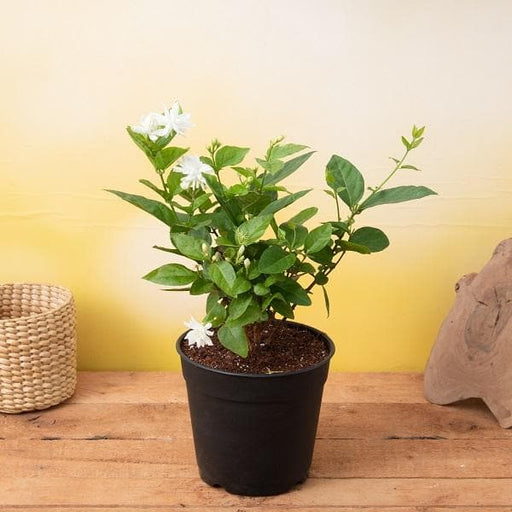
 Save 17%
Save 17%
Beautiful Fragrant Mogra, Arabian Jasmine Plant with Pot The Beautiful Fragrant Mogra, also known as Arabian Jasmine (Jasminum sambac), is...
View full details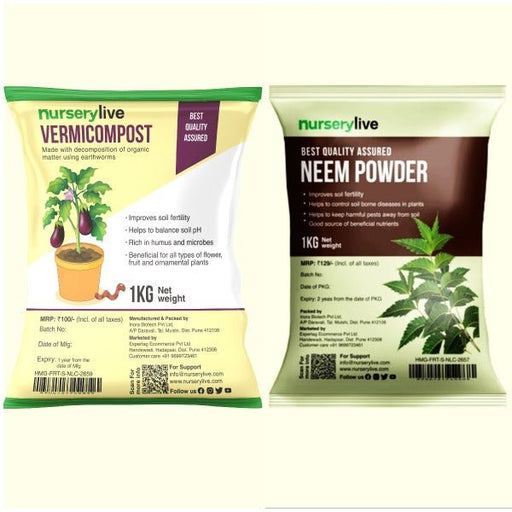 Save 15%
Save 15%
Pack of Vermicompost and Neem Cake for House Plants Transform your indoor garden with our premium Pack of Vermicompost and Neem Cake, spec...
View full details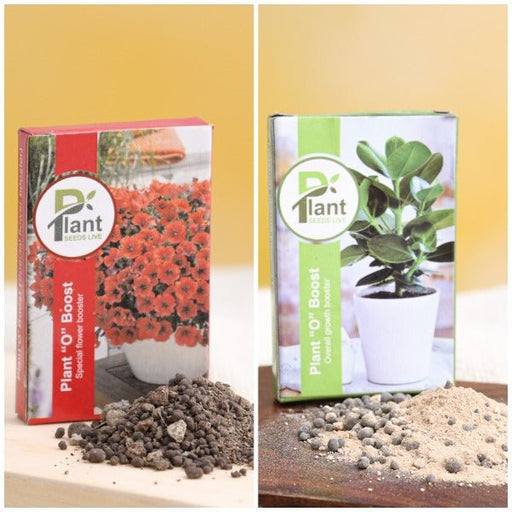
Pack of Plant Growth and Flower Boosters Unlock the full potential of your garden with our Pack of Plant Growth and Flower Boosters! This ...
View full details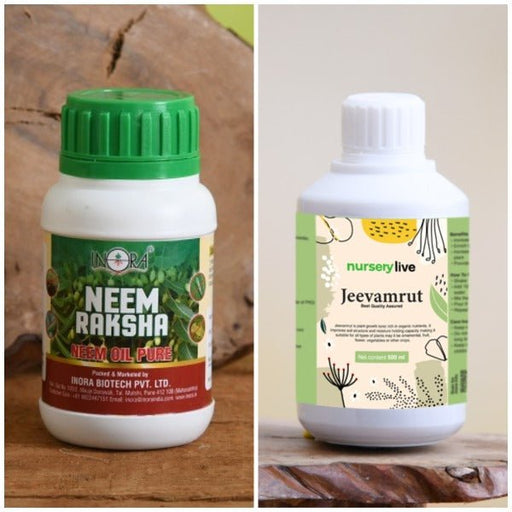 Save 38%
Save 38%
Combo of Jeevamrut and Neem Raksha for Easy Growth and Protection of Houseplants Transform your indoor garden with our exclusive combo of ...
View full details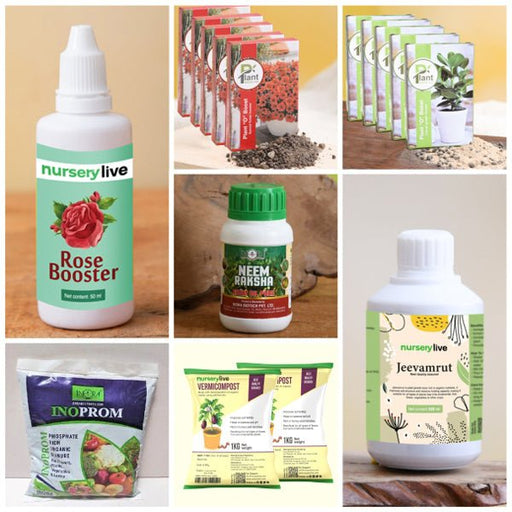 Save 22%
Save 22%
Plant Nutrients Kit (Pack of 16) for a Healthy Garden Transform your garden into a lush paradise with our Plant Nutrients Kit, featuring 1...
View full details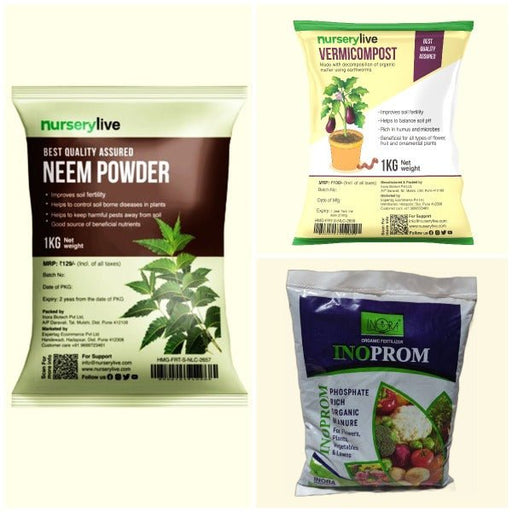 Save 16%
Save 16%
Combo of Top Plant Fertilizers Elevate your gardening game with our exclusive Combo of Top Plant Fertilizers, featuring two bags of premiu...
View full details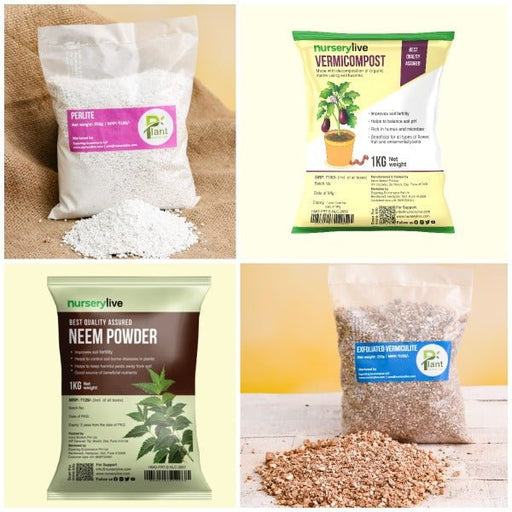 Save 24%
Save 24%
Pack of 4 Additives to Make Soil Healthy and Nutrient Rich Transform your garden into a thriving ecosystem with our Pack of 4 Additives de...
View full details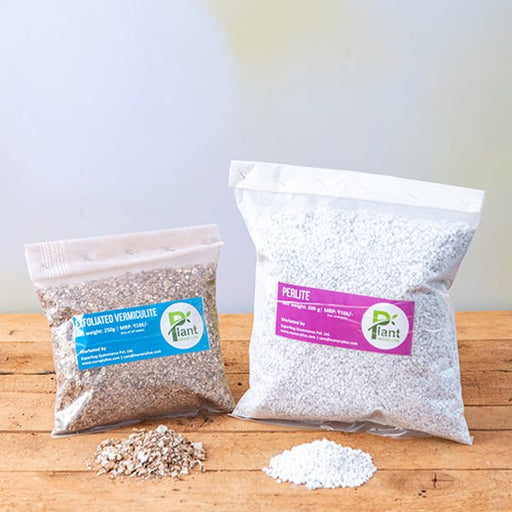 Save 30%
Save 30%
Transform your gardening experience with our premium Combo of Perlite and Vermiculite. This unique blend is designed to enhance soil aeration and ...
View full details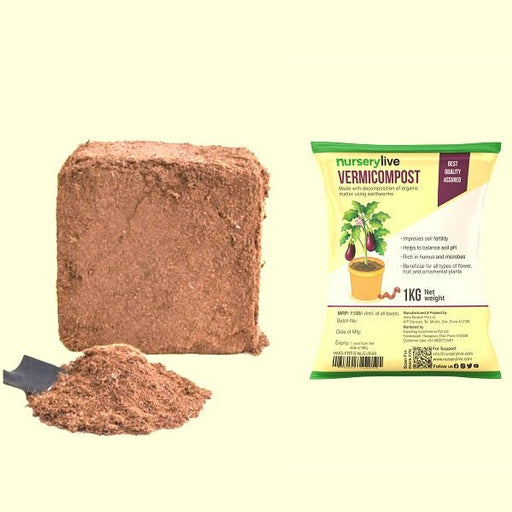 Save 27%
Save 27%
Combo of 2 Vermicompost and Cocopeat - Enrich Your Soil Naturally! Transform your garden into a thriving ecosystem with our Combo of 2 Ver...
View full details
 Save 35%
Save 35%
Best 6 Plants for Perfect Indoor Garden Transform your living space into a lush oasis with our curated collection of the Best 6 Plants for a...
View full details
 Save up to 50%
Save up to 50%
Mini Succulent Garden Pack Transform your space with our Mini Succulent Garden Pack, featuring a delightful collection of 4 any variety beautiful s...
View full details
 Save 30%
Save 30%
5 Best Fragrant Plants Transform your garden or indoor space into a fragrant paradise with our curated selection of the 5 Best Fragrant Plants. Th...
View full details
 Save 24%
Save 24%
Set of 2 Bonsai Looking Grafted Adeniums Transform your indoor or outdoor space with our exquisite Set of 2 Bonsai Looking Grafted Adenium...
View full details Save 45%
Save 45%
Top 4 Die Hard Succulents Pack Transform your indoor or outdoor space with our Top 4 Die Hard Succulents Pack, featuring a curated selecti...
View full details
 Save 30%
Save 30%
5 Best Indoor Plants Pack Transform your living space into a lush oasis with our '5 Best Indoor Plants Pack.' This carefully curated collection fe...
View full details
 Save 25%
Save 25%
Set of 4 Evergreen Air Purifier Plant Pack Transform your indoor space into a lush, green oasis with our Set of 4 Evergreen Air Purifier Pla...
View full details| SrNo | Item Name |
|---|---|
| 1 | Corchorus capsularis |
Corchorus capsularis, commonly known as white jute, is a tropical plant renowned for its strong, fibrous stalks. This remarkable plant is primarily cultivated for its fibers, which are used to produce eco-friendly jute textiles. With its rapid growth and minimal resource requirements, Corchorus capsularis is an excellent choice for sustainable agriculture, making it a favorite among environmentally conscious farmers.
What sets Corchorus capsularis apart is its dual utility: not only does it provide high-quality fibers, but it also contributes to soil health by preventing erosion. This plant thrives in various soil types and climates, making it a resilient choice for diverse agricultural practices.
One of the special features of Corchorus capsularis is its ability to grow in marginal soils, which are often unsuitable for other crops. This adaptability not only enhances biodiversity but also supports local economies by providing a source of income for farmers in developing regions.
This tree isn’t just a pretty face; it’s a multitasking marvel! Known for its fiber, Corchorus capsularis is the superstar behind jute production. Imagine a world without jute bags or ropes—chaos, I tell you! Beyond its fibrous fame, this tree also boasts medicinal properties, making it a go-to for traditional remedies. So, whether you’re looking to save the planet with eco-friendly materials or dabble in herbal healing, this tree has got your back!
Growing Corchorus capsularis is like hosting a party where everyone’s invited! This tree thrives in tropical climates, requiring well-drained soil and plenty of sunshine. It’s not picky about its friends, either; it can grow in various soil types. Just plant the seeds, water them, and watch as they sprout into a lush green spectacle. With a little love and care, you’ll have a thriving Corchorus capsularis tree that’s the envy of your garden!
If versatility were a tree, it would be Corchorus capsularis! This botanical wonder is not just about looks; it’s a jack-of-all-trades. From providing high-quality jute fiber for eco-friendly products to serving as fodder for livestock, this tree does it all. Plus, its leaves are edible and packed with nutrients, making it a delightful addition to your culinary adventures. Who knew a tree could be so useful?
Picture a tropical paradise, and you’ve found the ideal habitat for Corchorus capsularis! This tree loves warm, humid environments and flourishes in areas with plenty of rainfall. You’ll often find it in riverbanks and low-lying areas, where it can soak up all that moisture. It’s like the tree version of a beach bum, soaking up the sun and enjoying the good life!
Propagating Corchorus capsularis is as easy as pie! You can start with seeds or cuttings, and before you know it, you’ll have a mini forest of these beauties. Just ensure you provide the right conditions—sunshine, water, and a little TLC—and watch them grow. It’s like planting a little piece of nature’s magic that will reward you with beauty and utility!
its fiber! This tree produces jute, often dubbed the “golden fiber” for its economic value. Strong, durable, and biodegradable, jute is the eco-warrior’s best friend. From bags to textiles, this fiber is making waves in sustainable fashion. So, next time you see a jute product, give a nod to Corchorus capsularis for its contribution to a greener planet!
Who knew a tree could double as a pharmacy? Corchorus capsularis has been used in traditional medicine for ages. Its leaves and roots are believed to have anti-inflammatory and antioxidant properties. Whether you’re brewing a herbal tea or concocting a poultice, this tree is ready to lend a hand. It’s like having a personal herbalist right in your backyard!
Corchorus capsularis is not just a pretty tree; it’s an environmental hero! By growing this tree, you’re contributing to soil conservation and preventing erosion. Its deep roots help stabilize the soil, making it a champion in the fight against land degradation. Plus, it absorbs carbon dioxide, helping to combat climate change. Planting this tree is like giving Mother Earth a big hug!
Farmers, rejoice! Corchorus capsularis is a boon for agriculture. Its leaves can be used as green manure, enriching the soil and promoting healthy crops. Plus, it attracts beneficial insects, making it a natural pest control ally. This tree is like the ultimate farming sidekick, helping you grow bountiful harvests while keeping the ecosystem in check!
Corchorus capsularis isn’t just a tree; it’s a cultural icon in many regions! In countries like Bangladesh, jute is woven into the fabric of daily life, literally and figuratively. From traditional crafts to modern fashion, this tree has inspired generations. It’s a testament to how nature can influence culture, making it a beloved symbol of heritage and sustainability.
Even the mighty Corchorus capsularis has its foes! While generally resilient, this tree can fall prey to pests like jute hairy caterpillars and diseases such as root rot. But fear not! With proper care and vigilance, you can keep these pesky invaders at bay. Think of it as a game of botanical chess—stay one step ahead, and your tree will thrive!
Let’s talk dollars and sense! Corchorus capsularis is a significant player in the global economy, particularly in the jute industry. It provides livelihoods for millions of farmers and workers involved in jute production. As the demand for sustainable materials rises, this tree’s economic importance is only set to grow. Investing in Corchorus capsularis is like planting a money tree—just with a lot more environmental benefits!
Corchorus capsularis, also known as jute, is a leafy plant that’s not just a pretty face. It’s a superstar in the textile world, providing the fibers for burlap and twine. Plus, it’s a nutritional powerhouse, often used in traditional dishes. Who knew a plant could be so versatile and fashionable
Primarily found in tropical regions, Corchorus capsularis loves warm weather like a sunbather on a beach. Countries like India, Bangladesh, and China are its favorite hangouts. It thrives in well-drained soil, making it the diva of the agricultural world, demanding just the right conditions to flourish.
Corchorus capsularis is the Swiss Army knife of plants! Its fibers are woven into textiles, while its leaves are a culinary delight in various dishes. Additionally, it’s used in traditional medicine. Talk about multitasking! This plant knows how to keep itself busy while looking fabulous.
Absolutely! The leaves of Corchorus capsularis are not just for decoration; they’re a tasty addition to soups and stews. Packed with nutrients, they can be a healthy choice for your plate. So, next time you see jute, remember it’s not just a fiber; it’s a gourmet treat waiting to happen!
Harvesting Corchorus capsularis is like a plant party! Farmers cut the stalks when the fibers are at their prime, usually around 4-6 months after planting. The stalks are then bundled and dried, making it a fiber fiesta. Just be careful not to invite too many pests to the celebration!
Corchorus capsularis is a health nut in disguise! Rich in vitamins A and C, it boosts immunity and promotes healthy skin. Its fiber content aids digestion, making it a friend to your gut. Who knew a humble plant could pack such a nutritious punch while looking fabulous
Yes, Corchorus capsularis can be a pot-loving plant! Just ensure it has enough space to stretch its roots and soak up the sun. With proper care, you can enjoy this leafy beauty right on your balcony. Who says you need a garden to grow something fabulous
Corchorus capsularis thrives in warm, humid climates like a tropical vacation! It loves temperatures between 25-35°C and plenty of rainfall. If you’re in a cooler region, it might just sulk. So, if you want to grow this plant, consider it a sun-seeking diva that loves a good climate!
Patience is a virtue, especially with Corchorus capsularis! It typically takes about 4-6 months from seed to harvest. So, if you’re planting it, prepare for a little wait. But trust us, the wait is worth it when you see those beautiful fibers ready to shine!
Absolutely! Corchorus capsularis is an eco-friendly superstar. It grows quickly, requires minimal pesticides, and can improve soil health. Plus, its fibers are biodegradable, making it a sustainable choice for textiles. So, if you’re looking to save the planet, this plant is your green hero!
Like any diva, Corchorus capsularis has its share of admirers and pests. Aphids, whiteflies, and caterpillars can be pesky party crashers. Regular monitoring and organic pest control can keep these uninvited guests at bay. After all, every star deserves a little protection from the paparazzi!